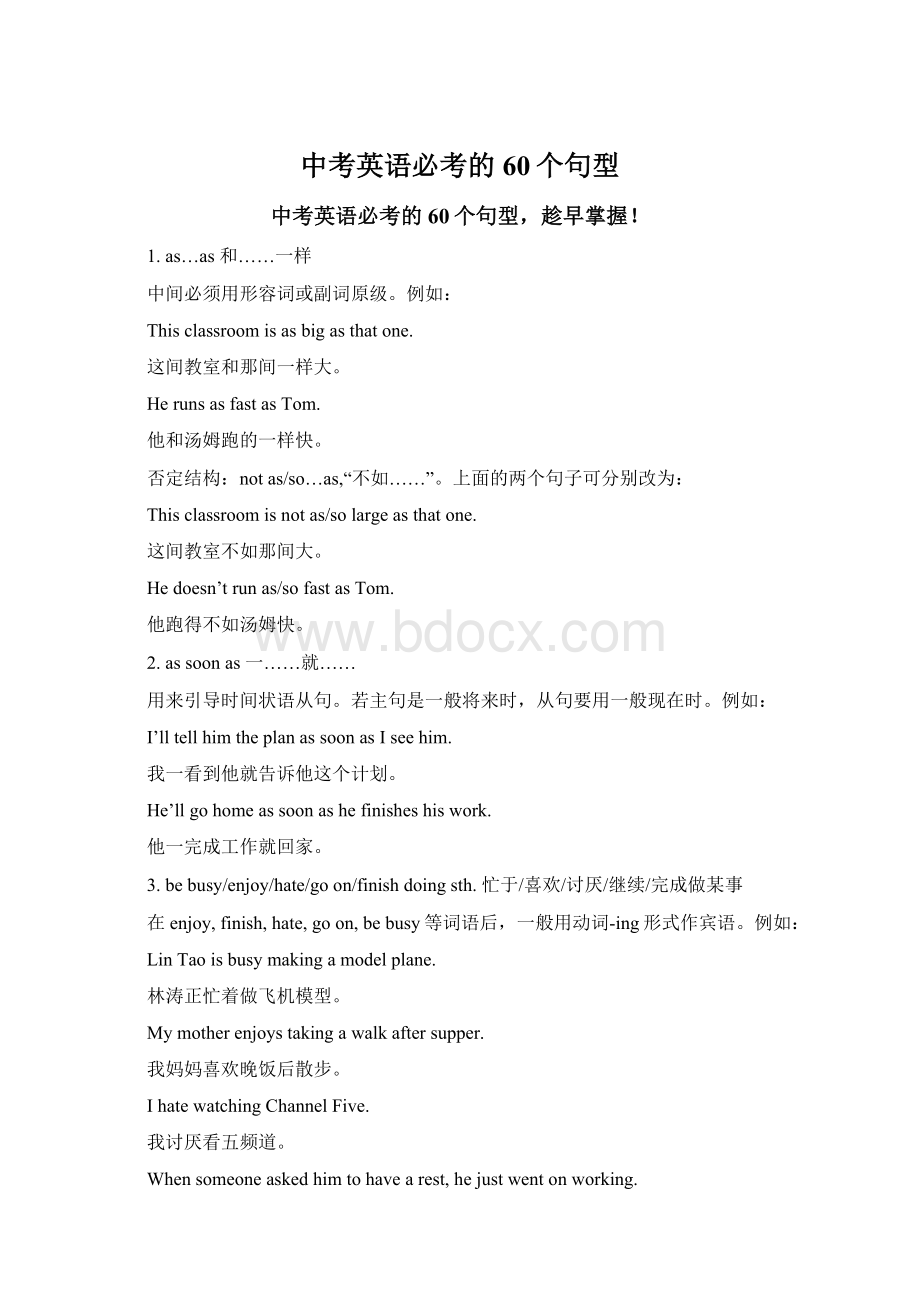中考英语必考的60个句型.docx
《中考英语必考的60个句型.docx》由会员分享,可在线阅读,更多相关《中考英语必考的60个句型.docx(14页珍藏版)》请在冰豆网上搜索。

中考英语必考的60个句型
中考英语必考的60个句型,趁早掌握!
1. as…as和……一样
中间必须用形容词或副词原级。
例如:
Thisclassroomisasbigasthatone.
这间教室和那间一样大。
HerunsasfastasTom.
他和汤姆跑的一样快。
否定结构:
notas/so…as,“不如……”。
上面的两个句子可分别改为:
Thisclassroomisnotas/solargeasthatone.
这间教室不如那间大。
Hedoesn’trunas/sofastasTom.
他跑得不如汤姆快。
2.assoonas一……就……
用来引导时间状语从句。
若主句是一般将来时,从句要用一般现在时。
例如:
I’lltellhimtheplanassoonasIseehim.
我一看到他就告诉他这个计划。
He’llgohomeassoonashefinisheshiswork.
他一完成工作就回家。
3.bebusy/enjoy/hate/goon/finishdoingsth.忙于/喜欢/讨厌/继续/完成做某事
在enjoy,finish,hate,goon,bebusy等词语后,一般用动词-ing形式作宾语。
例如:
LinTaoisbusymakingamodelplane.
林涛正忙着做飞机模型。
Mymotherenjoystakingawalkaftersupper.
我妈妈喜欢晚饭后散步。
IhatewatchingChannelFive.
我讨厌看五频道。
Whensomeoneaskedhimtohavearest,hejustwentonworking.
当有人让他休息一会儿时,他仍继续工作。
Ihavefinishedwritingthestory.
我已经写完了故事。
4.fill…with用……装满......;befilledwith充满了……;befullof充满了......
①befilledwith说明由外界事物造成的此种状态,表示被动。
例如:
Theboxisfilledwithfood.
盒子里装满了食物。
②befullof说明主语处于的状态。
此外,还可表示程度,意为“非常”。
例如:
Thepatient’sroomisfullofflowers.
那个病人的房间摆满了花。
Theyoungmanisfullofpride.
那个年轻人非常骄傲。
③这两种结构还可以相互改写。
例如:
Ifilltheboxwithfood.Theboxisfulloffood.
5.begood/badfor有利于/有害于……
此句型是:
be+adj.+for+n.结构。
例如:
Doingmorningexercisesisgoodforyourhealth.
做早操对你的健康有益。
Alwaysplayingcomputergamesisbadforyourstudy.
总玩电脑游戏对你的学习不利。
6.beusedto(doing)sth.习惯于……
后必须接名词或动名词,可用于现在、过去、将来的多种时态。
be可用get,become来代替。
例如:
Heisusedtolifeinthecountry.(Heisusedtolivinginthecountry.)
他习惯于乡村生活。
Hewillgetusedtogettingupearly.
他将会习惯于早起。
注意:
beusedtodo的意思是“被用来做……”。
例如:
Woodisusedtomakepaper.
木材被用来造纸。
7.both…and…两者都……
用来连接两个并列成分;当连接两个并列主语时,其后谓语动词用复数。
例如:
BoththestudentsandtheteacherswillgototheHistoryMuseumtomorrow.
不论老师还是学生明天都会去历史博物馆。
8.can’thelpdoingsth.禁不住做某事
help在此的意思是“抑制,忍住”,其后接动词-ing形式。
例如:
Hisjokeistoofunny.Wecan’thelplaughing.
他的笑话太有趣了,我们禁不止笑了起来。
9.sth.costssb.somemoney某物花费某人多少钱
此句型的主语是物。
cost一词带的是双宾语,它的过去式、过去分词和原型一样。
Thisbookcostmefiveyuan.
这本书花了我五元钱。
10.either…or…不是……就是……,或者……或者……
用来连接两个并列成分,当连接并列主语时,谓语动词与邻近的主语保持一致。
Youmayeitherstayhereorgohome.
你可以呆在这儿,也可以回家。
EithersheorIamright.=EitherIorsheisright.
不是她对就是我对。
11.enough(forsb.)todosth.足够……做……
在此结构中,for用来引出不定式的逻辑主语。
例如:
Theiceisn’tthickenoughforyoutowalkon.
这冰还没有厚到你可以在上面走的程度。
12.feellikedoingsth.想要做……
此处like为介词,后面跟动词-ing形式。
此句型与wouldliketodosth.同义。
例如:
Ifeellikedrinkingacupofmilk.
我想喝一杯牛奶。
13.feel/find/thinkitadj./n.todosth.认为某事……
在此结构中it为形式宾语,不定式短语作真正的宾语。
例如:
Ifinditveryinterestingtoplayfootball.
我发现踢足球很有趣。
Shethinksitherdutytohelpus.
她认为帮助我们是她的职责。
14.getreadyforsth./todosth.
getreadyforsth.意为“为某事做准备”;getreadytodosth.意为“准备做某事”例如:
Wearegettingreadyforthemeeting.
我们正在为会议做准备。
Theyweregettingreadytohaveasportsmeetatthatmoment.
他们那时正准备开运动会。
15.get/receive/havealetterfrom收到……的来信,相当于hearfrom
DidyoureceivealetterfromJohn?
你收到约翰的来信了吗?
Igotaletterfrommybrotheryesterday.
我昨天收到了我弟弟的一封来信。
16.hadbetter(not)dosth.最好(别)做某事
hadbetter为情态动词,其后需用动词原形。
hadbetter常用缩写,变成’dbetter,其否定形式是在其后直接加not。
例如:
Wehadbettergonow.=We’dbettergonow.
我们最好现在走吧。
You’dbetternotgooutbecauseitiswindy.
今天刮风,你最好别出去了。
17.havesth.done使(某事)完成(动作由别人完成)
sth.为宾语,done为过去分词作补语。
例如:
Wehadthemachinerepaired.
我们请人把机器修好了。
注意区分:
Wehaverepairedthemachine.我们(自己)已经修好了机器。
18.helpsb.(to)dosth./withsth.帮助某人(做)某事,其中的to可以省略。
例如:
Ioftenhelpmymotherwithhousework.
我常常帮助妈妈做家务。
Wouldyoupleasehelpme(to)lookupthesewords?
请你帮助我查查这些词好吗?
19.Howdoyoulike……?
你认为……怎么样?
与whatdoyouthinkof…?
同义。
例如:
HowdoyouliketheweatherinBeijing?
你认为北京的天气怎么样?
你觉得这部新电影如何?
20.Idon’tthink/believethat…我认我/相信……不……
其中的not是对宾语从句进行否定而不是对主句否定(否定前移)。
that可省略。
例如:
Idon’tthinkitwillrain.
我认为天不会下雨。
Idon’tbelievethegirlwillcome.
我相信那女孩不会来了。
21.Ithappensthat…碰巧…… 相当于happentodo,例如:
IthappenedthatIheardtheirsecret.
可改写为:
Ihappenedtoheartheirsecret.
我碰巧听到了他们的秘密。
22.It’s/hasbeen+一段时间+since从句自从某时起做某件事情已经一段时间了
该句型中since引导的时间状语从句常用一般过去时。
例如:
It’stwentyyearssincehecamehere.
他来这里已经20年了。
IthasbeensixyearssincehemarriedMary.
他和玛丽结婚已经六年了。
23.Itis+adj./n.+forsb.todosth.做某事对某人来说……
It是形式主语,真正的主语是不定式todosth。
例如:
It’snoteasyforustostudyEnglishwell.
对我们来说学好英语并不容易。
It’sagoodideaforustotraveltothesouth.
去南方旅行对我们来说是个好主意。
24.It’s+adj.+ofsb.todosth.
It是形式主语,todosth.是真正的主语,当表语(即形容词)能对逻辑主语描述时,常用介词of,而不用for。
例如:
It’sverypoliteofyoutogiveyourseattooldpeople.
你给老人让座,非常有礼貌。
25.Itseems/appears(tosb)that…(在某人看来)好像……
此句中的it是主语,that引导的是表语从句。
例如:
Itseemsthatheislying.
看样子他好像是在撒谎。
Itappearstomethatheneversmiles.
在我看来,他从来没有笑过。
26.Itis+数词+metres/kilometerslong/wide………是多少米(公里)长(宽)
用来表示物体的长(宽,高),如数词大于一,名词要用复数。
例如:
Itis20metreslongfromthisendtothatend.
从这端到那端有二十米长。
27.It’stimeforsb.todosth.是某人干某事的时候了
it是形式主语,真正的主语是动词不定式todosth.例如:
It’stimeforthechildtogotobed.
孩子该睡觉了。
比较下面两种结构:
①It’stimefor+n.例如:
It’stimeforschool.
②It’stimetodosth.例如:
It’stimetogotoschool.
28.Ittakessb.sometimetodosth.花费某人多少时间做某事
it是形式主语,真正的主语是动词不定式todosth。
例如:
Ittakesherfifteenminutestowalktothebusstopfromhere.
从这儿走着到公交车站将花费她15分钟。
Ittooktheoldmanthreedaystofinishthework.
那个老人花了三天时间完成这项工作。
29.keep(on)doingsth.一直坚持做某事
keepdoingsth.一般用于静态动词。
keepondoingsth.意为“继续不停地做某事”,一般用于动态动词,但二者的区别并不是很严格,有时可以互换。
例如:
Don’tkeepondoingsuchfoolishthings.
不要再做这样的傻事了。
Hekeptsittingthereallday.
他整天坐在那里。
30.keep…fromdoingsth.阻止......做某事
相当于stop…fromdoingsth.,prevent…fromdoingsth.在主动句中,stop和prevent后面的from可以省略,但在被动结构中,from不可以省略。
例如:
Pleasekeepthechildrenfromswimminginthesea.
请别让孩子到海里游泳。
Thebignoiseoutsidemyroomstoppedmefromdoingmyhomework.
屋外巨大的噪音使我不能做作业。
31.keepsb.doingsth.让某人一直做某事
不可和keepsb.fromdoingsth.结构混淆。
例如:
Whydoyoukeepmewaitingforalongtime?
你为什么让我等了很长时间?
32.makesb.dosth.使某人干某事
make意为“使”时,其后要有不带to的动词不定式。
例如:
Hemademeworktenhoursaday.
他让我每天工作10小时。
注意:
上句如改为被动语态,则work前的to不能省略。
例如:
Iwasmadetoworktenhoursaday.
33.neither…nor…既不……也不……
当连接两个并列主语时,谓语动词与邻近的主语取得一致(就进一致原则)。
例如:
NeitherwenorJackknowshim.
我们和杰克都不认识他。
Heneitherknowsnorcareswhathappened.
他对发生的事情不闻不问。
34.not…until…直到……才......
until后可跟名词或从句,表示时间。
例如:
Hedidn’tcomeuntillateintheevening.
他直到晚上很迟才来。
Hedidn’tarriveuntilthegamebegan.
直到比赛开始他才来。
35.sb.paysmoneyforsth.某人花钱买某物
此句型主语是人。
例如:
I’vealreadypaid2,000yuanforthemotorbike.
我已经花了2000元买这辆摩托车。
36.spendtime/moneyonsth./(in)doingsth.花费(时间、钱)在某事上/做某事
其中in可以省略,通常主语为“人”。
例如:
Ispentfiveyuanonthisbook.
我在这本书上花了五元钱。
Ispenttwohours(in)doingmyhomeworkyesterday.昨晚我花了两个小时做作业。
37.so…that…太……以至于……
用于复合句,that引导的是结果状语从句。
so是副词,后面应接形容词或副词,如果接名词,应用such。
例如:
Theiceissothinthatyoucan’twalkonit.
冰太薄了,你不能在上面走。
Heissuchakindmanthatwealllikehim.
他是一个非常好的人,我们都很喜欢他。
38.stoptodosth.,stopdoingsth.
stoptodosth.意为“停下来去做另一件事”,stopdoingsth.意为“停止正在做的事”例如:
You’retootired.You’dbetterstoptohavearest.
你们太累了,最好停下来休息一会儿。
Theteacheriscoming.Let’sstoptalking.
老师来了,咱们别说话了。
39.Thankyoufordoingsth.感激你做了……
for之后除了加动名词doing外,还可以加名词。
例如:
Thankyouforgivingmethepresent.
谢谢你给我的礼物。
Thankyouforyourhelp.=Thankyouforhelpingme.
谢谢你的帮助。
40.thanksto多亏……,由于……
thanks后的s不能省略,to是介词。
例如:
ThankstomyfriendJim,I’veworkedoutthisproblem.
多亏了我朋友吉姆的帮助,我已经解决了这个问题。
41.Therebe句型
①在此结构中,there是引导词,在句中不能充当任何成分,也不必翻译出来。
句中的主语是某人或某物,谓语动词be要与主语的数保持一致。
例如:
Thereisamanatthedoor.
门口有一个人。
当主语是由两个或者两者以上的名词充当时,谓语动词be要跟它邻近的那个名词的数一致(就近一致)。
例如:
Therearetwodogsandacatunderthetable.
桌下有两只狗和一只猫。
比较:
Thereisacatandtwodogsunderthetable.
②Therebe句型中的be不能用have来代替,但可以用lie(位于,躺),stand(矗立),exist(生存),live(生活)等词来替换。
例如:
Therestandalotoftallbuildingsonbothsidesofthestreet.
街道两旁矗立着许多高楼。
Therelieslakeinfrontofourschool.
我们学校前面有一个湖。
Oncetherelivedakinghere.
这儿曾经有一个国王。
Thereisgoingtobeasportsmeetingnextweek.
下周准备开一个运动会。
therebe的拓展结构:
thereseem(s)/happen(s)tobe…
Thereseemstobeonemistakeinspelling.
似乎有一处拼写错误。
Therehappenedtobearulerhere.
这儿碰巧有把尺子。
Thereseemedtobealotofpeoplethere.
那儿似乎有很多人。
42.The+adj.比较级,the+adj.比较级越……,越……
此句型表示一方随另一方的变化而变化。
例如:
Theharderheworks,thehappierhefeels.
他工作越努力,就感到越幸福。
Themore,thebetter.
多多益善。
43.too+adj./adv.+todosth.太……以至于不能…….
此句型为简单句,后面的to表示否定含义。
例如:
Theiceistoothinforyoutowalkon.
这冰太薄,你不能在上面走。
Thebagistooheavytocarry.
这个袋子太重搬不动。
44.usedtodosth.过去常常做某事
usedto是情态动词,表示过去的习惯动作或状态,现在已不存在,因此只用于过去时态。
例如:
Heusedtogetupearly.
他过去总早起。
WhenIwasyong,Iusedtoplaytennisveryoften.
我年轻时经常打网球。
否定形式有两种:
didn’tuseto;usednotto,例如:
Hedidn’tusetocome.=Heusedn’ttocome.
他过去不常来。
45.whatabout…?
……怎么样?
后面可接名词、代词、动名词等。
与“howabout…?
”同义。
例如:
WehavebeentoHainan.Whataboutyou?
我们去过海南,你呢?
WhataboutgoingtotheparkonSunday?
星期天去公园怎么样?
46.Whatday/dateisittoday?
今天星期几(几月几日)?
—Whatdayisittoday?
—Sunday.
—Whatdateisittoday?
—June24th.
47.What’swrong(thematter)with…?
……怎么了?
What’swrongwithyou,Madam?
夫人,您怎么了?
Youlookworried.What’swrongwithyou?
你看上去很焦急,出什么事了?
48.Whynotdo…?
为什么不做……?
谓语动词用原形。
与Whydon’tyoudo…?
同义。
例如:
Whynotgotoseethefilmwithus?
=Whydon’tyougotoseethefilmwithus?
为什么不和我们一起去看电影呢?
49.wouldliketodosth.想做……
后用动词不定式作宾语。
例如:
Iwouldliketodrinkacupoftea.
我想喝一杯茶。
疑问句式:
Wouldyoulike(todrink)acupoftea?
你想喝杯茶吗?
50.